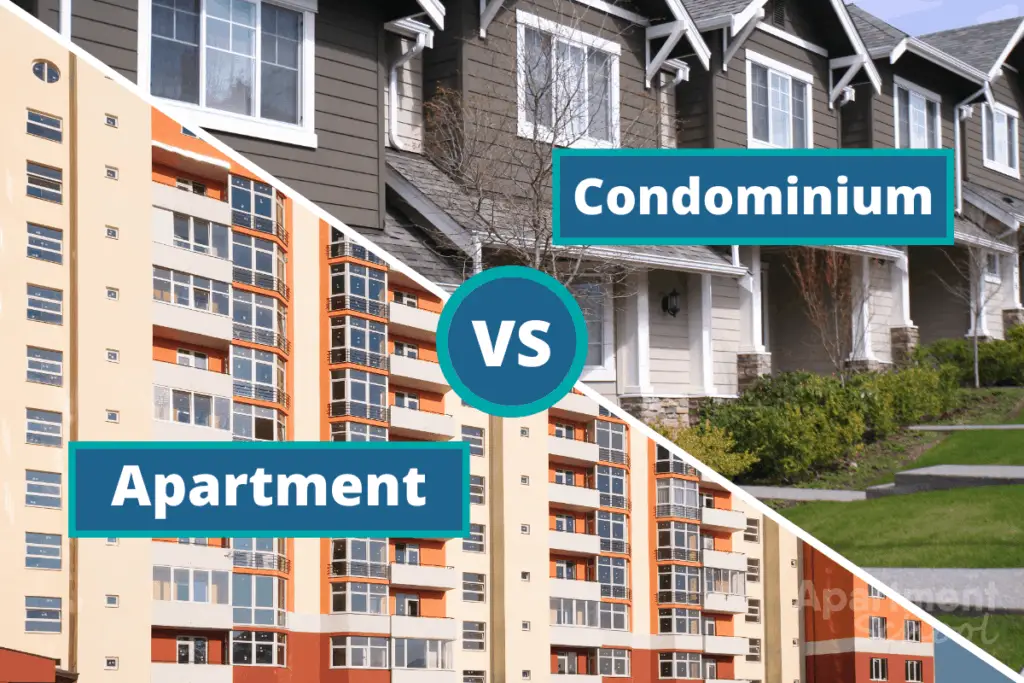
If you are looking for a new place to call home, but you’re not quite ready to purchase a house, the two things that most often come up on the radar of prospective renters are Apartments and Condos.
But what is REALLY the difference between the two? Does one have significant advantages over the other? Should I care what I’m looking at if the price is right?
I am going to walk you through the difference Apartments have from Condos, and if you are in the market for one or the other, which one is going to work best for you and your criteria for life.
Let’s jump right into the number one Apartment vs Condo question:
Are Condos and Apartments the same thing?
No, apartment and condos are NOT the same thing. Condos tend to be owned by an individual, while apartments tend to be owned by property management companies.
While ownership is the technical distinction between apartments and condos, this distinction actually leads to some stark differences between the two.
Because condos are owned by an individual, which literally could be anyone, they are going to be more vested in their property. That means that you are probably going to have a face to face with the actual owner of the property, and they are going to vet you to live in their condo or not.
With an apartment, chances are you are not going to be speaking with the owner on a regular basis. You will be talking to a manager or some other component of a much larger company that owns and operates the apartment complex from a remote location.
So OK, the primary distinction between an apartment and a condo is ownership. But let’s go through what those differences actually turn out to mean for a prospective tenant. What are the benefits of a condo? What are the benefits of an apartment?
Keep reading to find out.
Differences Between A Condo And An Apartment
Below I have listed out the 6 major things that differentiate apartments from condos and vice versa. By the time you get to the end, you will have a great idea of what type of property you are actually wanting to rent, with the specific set of rules, operation, costs, and amenities that fit your own personal lifestyle.
Ownership
Again, we come back to ownership because this is where the distinction starts. Condos tend to be owned by private individuals and quasi-managed by an HOA (Home Owner’s Association), while apartments tend to be owned by a property management company whose primary purpose is to buy and run apartment complexes.
I emphasize tend to because that’s how the majority of condos and apartments are owned and operated in the United States. I have however seen Condos be sold out by a management company, and an owner-landlord that deals directly with his own tenants. So, don’t think that the rule of ownership applies to every single case, it doesn’t, but it is a good rule of thumb to go by, especially when we start to talk about the differences YOU will notice when you are renting.
Because condos are owned and operated privately, that means that more time and personal attention can be spent on a unit, as opposed to a massive apartment complex owned by a business 3 states away. You are going to have personalized benefits with a condo you aren’t going to have with an apartment, but you are also going to have fewer rules and costs on average with an apartment.
There are always trade-off’s when choosing between the two. Let’s walk through the benefits that renters of both condos and apartments see on a daily basis, and what is important to YOU.
Cost
Let’s talk about Apartments first because they are very straightforward as far as their costs are concerned. You have a set amount to pay for rent, maybe 1 or 2 month’s rent for a security deposit, and you are good to go. You know the amenities you have to use, they are laid out in the lease. Something goes wrong, the apartment complex is going to take care of it, fairly hassle-free on your part.
Now, let’s take a look at Condos.
First off, with condos, you are going to have the option to buy or rent. If you buy a condo, the process is going to look very similar to that as if you are buying a house. A house that operated under HOA guidelines at all times. You are going to have to put money down, get insurance, pay the taxes, everything.
If you are renting a condo, (Which we are going to assume most people reading this are going to do) then you are more than likely going to go into a contract with another individual and work out the details of the security deposit, rent, how it’s paid, rules, etc.
The additional costs that you will have when staying in a condo are the HOA fees. Every HOA has fees. This is the governing body that brings multiple condos together so that everyone is operating and living under the same guidelines. Whether you like the idea of an HOA or not, it is what it is when dealing with condos.
Condos also tend to cost a bit more per square feet than apartments do. This is because Condos tend to have higher quality amenities and be in a more favorable part of town than apartments, which we will go into below. But that doesn’t mean apartments aren’t attractive either. Their lower cost and ease of rental makes them the go-to for many people.
Location
Condos are a function of the ’90s to the present for various reasons. This means that condos are typically built in good locations in the eyes of the owners of the condo, and have been updated more recently. A condo is going to have a MUCH higher chance of looking like a furnished home with great fixtures, molding, and countertops than an apartment will. But you will pay for the privilege.
You will be able to find apartments in virtually any town, from the smallest of cities to the largest urban areas. With condos, they are typically going to focus on building around commercial and urban areas that are currently being developed. This is done to both anticipate the future appreciation of the condo for the owner, while at the same time providing convenient access to work and play to those who end up renting from them.
Both are going to try and be centrally located, but you are going to be more likely to find apartments and apartment complexes in smaller towns than you are condos.
Maintenance
This can be a BIG difference to those looking for apartments vs. condo.
When you are renting an apartment, if something goes wrong in your unit, maintenance will come and fix it almost immediately, especially if it is a major issue. There are some things that they will charge you for, especially if you were the direct cause of the issue, but everything else is on them. And more than likely, they have either a maintenance guy on-site, or someone contracted to work for them 24 hours a day. This is a HUGE benefit to apartment life.
With condos, you are going to be on the hook for everything. Essentially, no matter what the problem is, you are going to be responsible for fixing it or taking care of the issue. Think of living in a condo like living in a house. Even if someone else owns it, chances are, you are going to be responsible for fixing it. This means that with condos, the cost of living can go up at times due to repairs and maintenance.
Rules
Both Condos and Apartments are going to have rules associated with them for how tenants are supposed to conduct themselves and respect others around them while at the complex or condo.
The difference with condos is that you are going to have to deal with an HOA, which is a Home Owner’s Association.
An HOA is going to tell you whether you can have a pet, how large the pet can be, where it can be walked, where you can and can’t park your car, how high the grass has to be, what color of paint you can use on the outside of your condo… and the list of things that you have to abide by is never-ending.
And you PAY additional fees for the privilege.
This can be a positive to those looking for conformity and ensuring that they aren’t going to have someone move in next to them and paint their condo pink, which would destroy their own property value.
If you are looking for more laid back rules, apartments are where it’s at. Not that apartments don’t have rules, they absolutely do, and you can quickly and easily be evicted from an apartment by not following them, but they don’t infringe upon your life as much as your typical HOA will, and with an apartment, you have no extra costs to pay for these rules either.
Amenities
Amenities are kind of a funny one because the standard perception is that condos have better amenities and apartments are just so-so.
In my experience, condos on average, DO have a bit better facilities such as pools, fitness, public picnic and grilling areas, etc. But I have also seen condo developments that have no facilities at all, and apartment complexes that have everything from multiple pools to their own golf course!
It is all about what is available in the area that you are looking for. If you can find an apartment complex that lives like a townhouse then, by all means, go for it!
More rules with condos actually mean you will tend to get a more homogenous group of people living there or a group of people who are all satisfied with the rules and conditions of living in the group of condos. This can settle some worries people have about who could possibly be moving in as neighbors.
Apartments are again, very straight-forward in how they run and operate. Abide by their rules and there will be absolutely NO problem with your rental experience at all!
So Which Is Better? A Condo or Apartment?
The answer to which is better, a Condo or an Apartment is up to the individual renter and what sort of features, amenities, and location they are wanting for a particular price. This can only be determined by the individual renter.
Knowing the difference in what you are looking for is the key to having a good renting experience though, whether that be in a condo or in an apartment.
